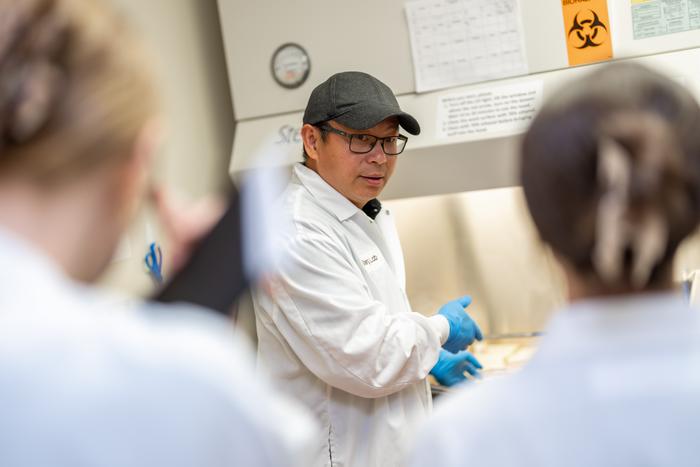For many patients with a deadly type of brain cancer called glioblastoma, chemotherapy resistance is a big problem.

Credit: Clayton Metz/Virginia Tech
For many patients with a deadly type of brain cancer called glioblastoma, chemotherapy resistance is a big problem.
Current standard treatments, including surgery, radiation, and chemotherapy using the drug temozolomide, have limited effectiveness and have not significantly changed in the past five decades. Although temozolomide can initially slow tumor progression in some patients, typically the tumor cells rapidly become resistant to the drug.
But now, Virginia Tech researchers with the Fralin Biomedical Research Institute at VTC may have moved a step closer to a solution.
Working with glioblastoma cell cultures, including glioblastoma stem cells derived from patient specimens, and laboratory mouse models harboring human cancer cells, scientists have pinpointed an effective molecular signaling pathway that is thought to be crucial for cancer cell survival during temozolomide treatment. The findings are now online in iScience, an open-access journal of Cell Publishing.
“In the past 50 years, treatment options for glioblastoma have remained largely unchanged, relying on surgery, radiation, and temozolomide,” said Zhi Sheng, senior author of the study and assistant professor at the Fralin Biomedical Research Institute. “However, temozolomide’s effectiveness is limited, and resistance to the chemotherapy inevitably develops in patients. Since it’s the only currently available approved chemotherapy that can effectively reach the brain, finding ways to restore its effectiveness is crucial in addressing the treatment failure in glioblastoma.”
Researchers examined the Phosphoinositide 3 Kinase (PI3K) molecular signaling pathway, which is like a communication system inside cells. It tells cells how to grow, survive, and divide. When this pathway is activated, it can promote cancer growth, so scientists and clinicians generally thought blocking it could be a way to treat cancer.
Their results have not been successful.
In the new research, Fralin Biomedical Research Institute scientists found that in some brain cancer patients who didn’t respond to treatment, levels were high of a specific form of the signaling protein called PI3K-beta that helps regulate cellular processes.
When they blocked just PI3K-beta in cell cultures and mouse models harboring cancer cells, the tumor cells became more sensitive to temozolomide treatment. In addition, using a drug that blocks PI3K-beta along with the usual treatment slowed down the cancer cells’ growth.
Researchers are uncertain why PI3K, in its various forms, are very similar in structure yet do different things in the body.
“The reason previous treatments targeting the PI3K pathway failed is because they didn’t distinguish between PI3K-beta and its related proteins,” Sheng said. “This research shows that PI3K-beta is specific to glioblastoma, making it the crucial target for effective treatment.”
Going forward, overcoming the blood-brain barrier remains a hurdle for delivering P13K-beta inhibitors into the brain, which will be crucial for translating the findings into the clinic to help patients.
“We will resolve these issues in our future studies,” Sheng said.
Co-first authors of the study are Kevin Pridham, a former postdoctoral associate at the Fralin Biomedical Research Institute, and Kasen Hutchings and Patrick Beck, two former medical students at the Virginia Tech Carilion School of Medicine who are pursuing their medical careers in radiology in Las Vegas and pediatrics in Philadelphia, respectively.
Cell specimens were provided by Carilion Clinic. Study results are in part based on data generated by The Cancer Genome Atlas Research Network, the Dependency Map, the Genotype-Tissue Expression, or the Chinese Glioma Genome Atlas. The research was supported by the National Institutes of Health.
Journal
iScience
DOI
10.1016/j.isci.2024.109921
Method of Research
Experimental study
Subject of Research
Cells
Article Title
Selective regulation of chemosensitivity in glioblastoma by phosphatidylinositol 3-kinase beta
Article Publication Date
7-May-2024
COI Statement
Authors have no conflicts of interest to declare.




